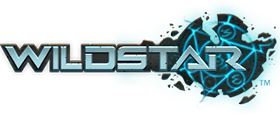WildStar: Lunch with Da Gaffer Pt 3
Carbine's Jeremy Gaffney discusses dynamic content, add-ons and social tools.
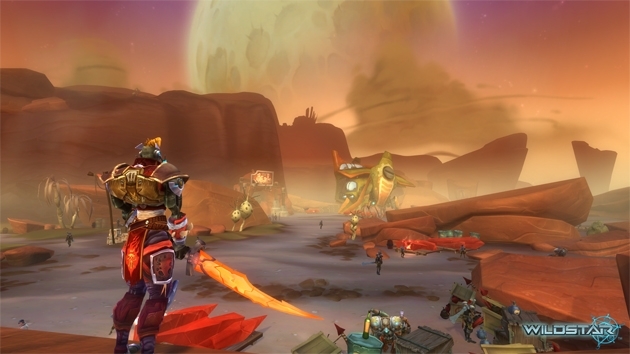
When you look at it in bite-size chunks, it’s difficult to realize just how big a project like WildStar really is. Over the course of a two hour lunch, executive producer Jeremy Gaffney answered a series of questions from the UK community that really showed how much Carbine Studios has sunk into its upcoming MMO.
Earlier in the day we discussed the changing industry, upcoming reveals and the raiding scene. Once lunch arrived, conversation shifted to PvP and class design. Both sections are well worth a read if you haven’t managed to already.
As the sunny Brighton afternoon drew on, we turned to WildStar’s add-ons and social tools. But before we got to that, Jeremy reminisced about earlier times as one of the founders at Turbine.
There’s a saying that heading up an MMO games studio is like being captain of an oil tanker.
It’s certainly cat-herding plus an awful lot of other metaphors. Everybody’s insane too; if you’re in games you’re doing it because you love it. You’re not doing it to make money because most games don’t make money. You probably made a bunch of other unwise career decisions along the way.
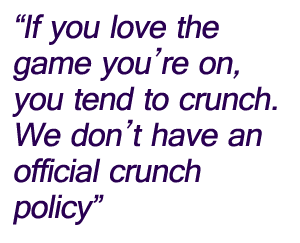 When we started Turbine, it was a start-up. And we were broke, because we were self-funded, and we were poor. And so we would only hire really brilliant people, and we would pay them very little money. And when you do that, something has to give. That something is usually social skills, or hygiene or some other some other thing that has to crack.
When we started Turbine, it was a start-up. And we were broke, because we were self-funded, and we were poor. And so we would only hire really brilliant people, and we would pay them very little money. And when you do that, something has to give. That something is usually social skills, or hygiene or some other some other thing that has to crack.
You’d come in our office, and the first thing you would see is this guy at the front desk who was allergic to everything. He was sitting in the receptionist’s area because he was allergic to the drop ceiling and the paint in the other room.
And so you’d bring in your investor to try and pump up the company and get more money, and not close next month (the joy of start-ups). And this guy was socially anxious, so he’d freak out whenever he met a new person. So he’d see the investor, start hyperventilating out of nervousness, and then just drop out of sight entirely. After a few moments he’d come back up, wearing an oxygen mask that he has for the purpose, because of his anxiety.
And this is your first introduction to the office.
You’d get into the office, and you start smelling something weird. One of the guys gave up his apartment because he worked so much; he though ‘Hey, I’ll just move into the closet.’ But we didn’t have showers. After three or four months, our treasurer took him out of the closet, dragged him back to his apartment, the guy screaming the whole time. ‘You guys are smell Nazis man, if I’d known there was a smell code I’d never have worked here!’ Took him back to the apartment, soaked, showered and shampooed him, all fully clothed, took him back to the office and stuck him back in the closet. And that was it for the next two or three months.
We’re not quite that way [at Carbine] because we’re funded, but there are a lot of crazy people.
Every milestone we do, each team does a little video. We don’t release them publicly; we show them at Arkship and stuff under NDA sometimes. Some are boring, the class guys are like ‘[monotone] Here’s the new balance for the Spellslinger,’ and some of them go nuts. The UI guy for the last one did an entire Dev Speak parody through the whole thing, and it was brilliant. He was poking at [Stephan] Frost the whole time. I wish we could release them to the public, but there’re races and classes and features that haven’t been revealed.
Do you still have people camping out in the office? Is there anything that can blow you off course?
We get a lot of that anyway – if you love the game you’re on, you tend to crunch. We don’t have an official crunch policy. Legally you can’t anymore; it used to be, during the Blizzard era, there was a six month mandatory crunch, with weekends and all that stuff.
We do free food every night, and there are about 80 to 90 folks who sign up for it each day, sometimes more, sometimes less, and half of us forget and you vulture food afterwards. But you do it because you like it, not because there’s a gun to your head about it.
Of the things that can blow us off-course, the mantra that I give our guys is this: the mission has to be that it’s got to be quality levelling, so that means we get all of our zones in and complete, we polish them up before they hit beta – we’ve been letting some of the rough versions into beta, but you want to polish it up as much as possible before it hits the public – you’ve got to listen to the feedback and you’ve got to take the time to respond to it well.
It’s very hard doing all those things at once. You can usually do two of those well in a month, and then one suffers. So we’ve been adjusting schedules and stuff to make sure we’re doing the right thing in terms of those foci.
Once you get levelling complete it’s then getting the elder game in early enough and tested well enough that it’s compelling.
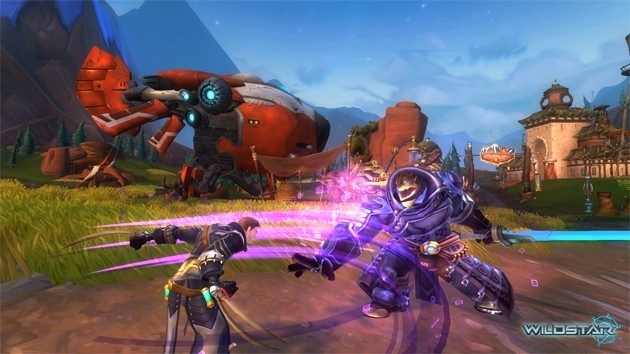
We’ve seen the devs get very involved with the community pre-launch. Are there any plans to continue this post-launch?
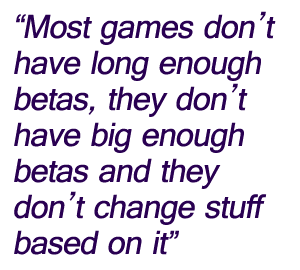 It seems like a lot of work pre-launch, and it is; it’s 6 or 7 years of toil, crunch and all that. But the work actually really happens in live. The number one thing that we’ve done is set up to be flexible, so we can easily add stuff to the game, so that we have the right feedback mechanisms, the right data analysis mechanisms to react to what’s going on in the world, and doing the right level of listening and analysing.
It seems like a lot of work pre-launch, and it is; it’s 6 or 7 years of toil, crunch and all that. But the work actually really happens in live. The number one thing that we’ve done is set up to be flexible, so we can easily add stuff to the game, so that we have the right feedback mechanisms, the right data analysis mechanisms to react to what’s going on in the world, and doing the right level of listening and analysing.
The goal is that we’ll have a freaking patch cycle. I don’t know if we’ll swear to it publicly, but you have to in this day and age. Look at Guild Wars 2 having a two week cycle, WoW’s moving to a faster cycle by all rumors, and it’s because people react well to it. We’re not in an era where things can take three months to fix, and it’s part of what makes the world feel alive.
So I’ve been stoked. We’ve been adding 40 to 70 pages of patch notes every six weeks, and that’s pretty significant. The next part is to step up a point; the target’s probably more like 3 weeks, at most four and at best one or two. And if you’re listening properly, if you do it wrong then you make changes that people don’t want and you piss them off.
WoW’s actually done a good job of that; they do massive class tunings all the time, and they’ve never really burned out a large number of users by doing so. There’s been squabbling from time to time but, in general, they’ve kept their numbers growing through that.
What I want from my team is to master that art form. So we have to master it during beta and then carry it through to live. Beta can theoretically screw up stuff, but in practice you want it to go smooth as heck.
Most games don’t have long enough betas, they don’t have big enough betas and they don’t change stuff based on the beta. Beta’s not a marketing exercise, it’s a development exercise. Only at the end should it be a marketing exercise.
When we did the Gamescom announcement [in 2011], the only thing we wanted was about 20,000 names to be able to kick off the beta. That’s literally all we wanted, because otherwise, why not start the hype as late as possible? But we needed feedback for the game – it’s the whole reason we did it. We just passed 574,000 beta names, so yay.
But simultaneously, now there’re people going ‘[growling] Let us in the frikkin beta!’ We’re not trying to market to you, we’re just trying to make our game better!
How is beta going?
I think it’s going great. The numbers have risen regularly. We’ve got our concurrency numbers getting higher every week, which is good because it means people are engaging.
 The game’s in many ways at an early stage. What’s at late stage is that combat feels fun and pretty polished, so we do lots of tuning and tweaking. Content, we tweak the monster density – is there enough variance, is there enough compelling in each area?
The game’s in many ways at an early stage. What’s at late stage is that combat feels fun and pretty polished, so we do lots of tuning and tweaking. Content, we tweak the monster density – is there enough variance, is there enough compelling in each area?
The part that we’re really working on and, in my mind, needs the most love, is that full cycle. I wake up at my house, I planted herbs in my garden last night, ‘Ooh, rare spawn, I’ll plant that!’ Then I go and adventure for the day, gather a bunch of stuff that’s all going to pay off at my house. I go back to my house at night, I plant all my stuff. And now I’m compelled to come back the next day to see what rare stuff popped up. What came in my mailbox from the quest giver who I did a thing for and got a reward from?
That’s the cycle that we can’t have tuned until there’s a critical mass of players, especially the social aspects of it. You just need a mass of players. The game feels so different –there’re only 200-odd of us in the office, which sounds like a lot but that’s a low concurrency to test the game. The world feels empty with only 200 people in it – what’s the right density for having 5000 people running around the world; especially when we do instanced battlegrounds and housing that pull people out of the world.
People getting high enough level to go to the towns and cities and do all the stuff there. Figuring out the density for us is just something different than City of Heroes, or World of Warcraft, or any other game, because of the combination of different stuff we’re drawing people out to. So that’s what I really want to focus our beta time on, that and elder game.
We do warplot tests around the office, and they’re cool. We do have some ‘l33t’ raiders and PvPers who can give it a workout, but we don’t have any of them who can get together regularly to do it, and they’re not doing it usually with characters they raised up from level one so they understand it fully.
Polishing elder games is frikkin’ hard. But it’s also a secret that, if you don’t do it, you screw the attention. You get three million people who buy the box, then two million the next month, then one million the next, then you’re 40,000 by month six. It’s not the actual way to make money. That’s not the way to have a good game.
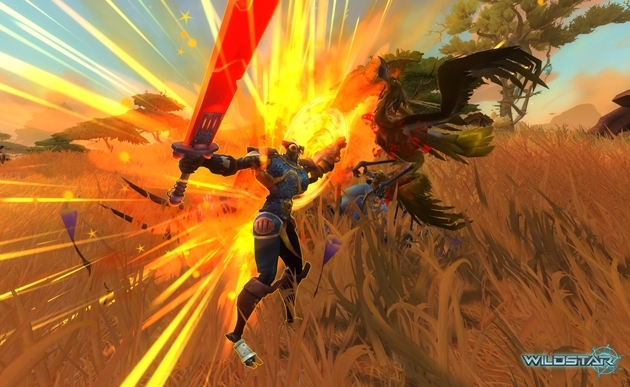
Do you think you’re still on track for release this year?
It’s ready when it’s ready. I work through the schedules with my guys and that kind of stuff, but I think I’ll give a resounding ‘I don’t know’ to that. Beta feedback will dictate that more than any single other thing.
When did you decide that social tools were so important that you’d embed a team into the game design?
 The way that we’re broken up is that we have feature teams who work on each aspect of the game; Combat, Creatures and Classes are the largest of them. But Social is one of those critical teams, they do not just [work on] housing, but guild management and all that kind of stuff. And that team’s had that focus from early on.
The way that we’re broken up is that we have feature teams who work on each aspect of the game; Combat, Creatures and Classes are the largest of them. But Social is one of those critical teams, they do not just [work on] housing, but guild management and all that kind of stuff. And that team’s had that focus from early on.
The thing about socializing is that it’s a force-multiplier. You play the game your friends play. As a developer, if you make a game where it’s easy to make friends, that helps. If you make a game where it’s easier for me to move in as a crew, and it’s harder for them to move out because they get attached to all the tools, where they can have a better time interacting in your game than other ones, you win.
There’s a bridge where it’s tough to meet people in-game in an interesting way, and the more the game’s been streamlined, the harder it becomes. I have friends that I still keep today because they saved me in a newbie area in EverQuest, and then you start grouping together and work together. That doesn’t exist in most games because they’ve been streamlined. And to a benefit – losing all your crap at level six or being forced into a group was not necessarily fun. But the social ramifications of making it too easy had an impact.
That’s why that stuff’s all important for us – it’s the glue that holds everyone together. You can have a great socializing game and all the other systems suck, you’re going to have a critical mass of people stay there forever, because socializing’s part of retention. It also helps with acquisition, because you tend to play the games your friends play.
